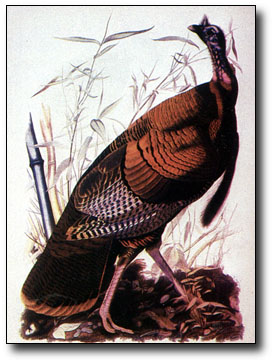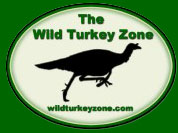| |
| Wild
Turkey Hunting Articles -- |
The
History of Thanksgiving
by Rob Ramsdale 11/9/04
|
|
|
The
Wild Turkey & Thanksgiving
|
|
The
Wild Turkey and its Role in the Thanksgiving Tradition
 The
wild turkey (Meleagris gallopova) is native to North
America and was a staple in the Native American
diet. Wild turkeys were probably first domesticated
by native Mexicans. Spaniards brought back tame
Mexican turkeys to Europe in 1519, and they reached
England by 1524. They were imported by the Spaniards
via Turkey (the country.) It was confused in those
early times with the Guinea fowl which also arrived
via Turkey, and both birds were called turkeys in
those days. When it was assigned its latin name
in the 18th century, the name turkey still stuck.
Native Americans called it peru with no reference
to the country of the same name. The Pilgrims actually
brought several of these domesticated turkeys to
America on the voyage in 1620. The
wild turkey (Meleagris gallopova) is native to North
America and was a staple in the Native American
diet. Wild turkeys were probably first domesticated
by native Mexicans. Spaniards brought back tame
Mexican turkeys to Europe in 1519, and they reached
England by 1524. They were imported by the Spaniards
via Turkey (the country.) It was confused in those
early times with the Guinea fowl which also arrived
via Turkey, and both birds were called turkeys in
those days. When it was assigned its latin name
in the 18th century, the name turkey still stuck.
Native Americans called it peru with no reference
to the country of the same name. The Pilgrims actually
brought several of these domesticated turkeys to
America on the voyage in 1620.
The American version of the wild turkey was introduced
to the early Pilgrim settlers by the native american
Wampanoag tribe after the Pilgrims arrived in
1620.
The first year for the settlers was bleak, with
many dying from the journey. That first winter,
46 of the original 102 Pilgrims died. Their seeds
planted the next spring, aside from barley, did
not produce any usable crops. The Wampanoag assisted
the settlers, introducing them to native foods
such as corn and squash and showed them how to
hunt and fish. The first Thanksgiving was celebrated
in 1621 at the request of Governor William Bradford,
and the Wampanoag were invited guests of honor.
There is no specific mention of wild turkey in
Edward Winslow's account of this first Thanksgiving
but there was mention of "fowl" which
most likely included wild ducks and turkeys. Edward
Winslow wrote this in a letter dated December
12, 1621. The complete letter was first published
in 1622.
Our corn [i.e. wheat] did prove well, and
God be praised, we had a good increase of Indian
corn, and our barley indifferent good, but our
peas not worth the gathering, for we feared
they were too late sown. They came up very well,
and blossomed, but the sun parched them in the
blossom. Our harvest being gotten in, our governor
sent four men on fowling, that so we might after
a special manner rejoice together after we had
gathered the fruit of our labors. They four
in one day killed as much fowl as, with a little
help beside, served the company almost a week.....
The only other description of the "First
Thanksgiving" was written about twenty years
after the fact by William Bradford in his "History
Of Plymouth Plantation". Bradford's "History"
was rediscovered in 1854 after having been taken
by British looters during the Revolutionary War.
Its discovery prompted a greater American interest
in the history of the Pilgrims. It is also in
this account that the Thanksgiving turkey tradition
is founded.
They began now to gather in the small harvest
they had, and to fit up their houses and dwellings
against winter, being all well recovered in
health and strength and had all things in good
plenty. For as some were thus employed in affairs
abroad, others were exercising in fishing, about
cod and bass and other fish, of which they took
good store, of which every family had their
portion. All the summer there was no want; and
now began to come in store of fowl, as winter
approached, of which this place did abound when
they came first (but afterward decreased by
degrees). And besides waterfowl there was great
store of wild turkeys, of which they took many,
besides venison, etc. Besides they had about
a peck of meal a week to a person, or now since
harvest, Indian corn to that proportion. Which
made many afterwards write so largely of their
plenty here to their friends in England, which
were not feigned but true reports.
Conclusion
-
Wild turkey were most likely served at the first
Thanksgiving and remain a fixture in Thanksgiving
menus to this day.
|
|
|
|
|

